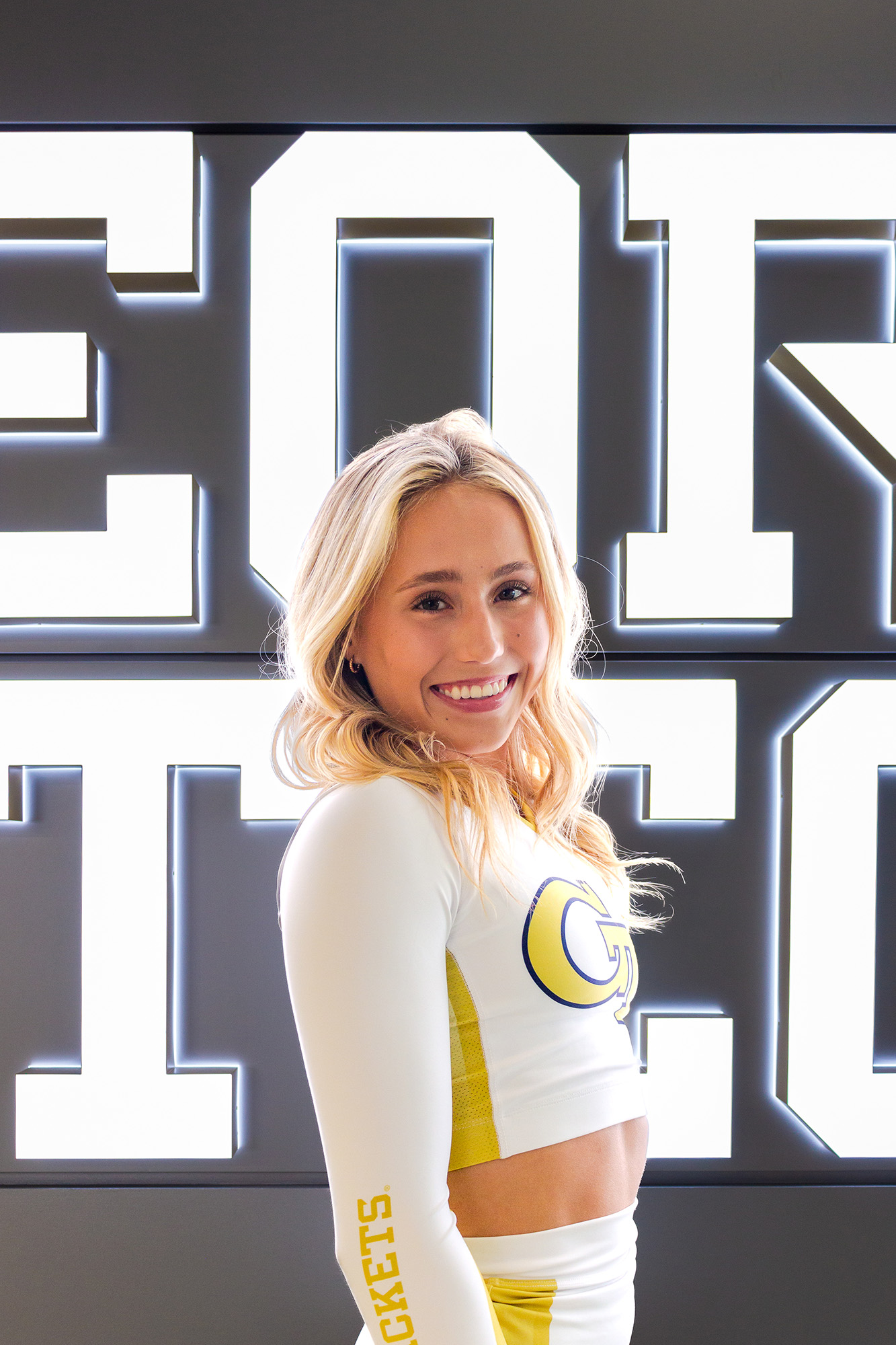
Carving a Path at Georgia Tech, from Cheerleading to Sustainable Sportswear
Hailing from Augusta, GA, Ashley Foreman was drawn to Georgia Tech’s School of Materials Science and Engineering (MSE) because of the close-knit community the program fosters. Highly invested in athletics and GT’s Cheerleading team, Ashley found support in the program, leading to her being able to perfectly balance her academic work with athletics. “Tech offered a good balance between academics and athletics,” she explains. “Being a student-athlete, it was important for me to find a program that understood the demands of both.”
A Passion for Material Innovation
Ashley’s decision to major in MSE developed from her interest in the chemical makeup of cosmetics. Additionally, she connected science to her love for cheerleading, recognizing the important role materials play in sports equipment to combine her interests in sports technology and chemistry.
Ashley finds inspiration about materials in everyday life. From an early age, she explained that she was fascinated with slime and the materials used to make LEGOs and other hard materials. This led to a project in which she literally smashed LEGOs to analyze their composition. “I’ve always been interested in the materials around me,” she says. “From exploring slime as a kid to studying how LEGOs are made, I’ve always wanted to understand what makes things work.”
Finding a Home in the MSE Program
The MSE program provided a fertile environment for Ashely’s interests to expand. Her first MSE class, Professor Naresh Thadhani’s MSE 1111: Introduction to Material Sciences, included her entire cohort. This setup allowed her to develop relationships and build a close community in the MSE department. The small class size also allowed Ashley to connect with fellow students whoshared similar passions for the field.
She explains that MSE 1111 laid a strong foundation for future coursework and led seamlessly into MSE 2001: Principles and Applications of Engineering Materials. This course goes in-depthon the structure of materials. The progressive learning approach made the field more accessible. “[Professor Thadhani’s] course was great,” Ashley explains, “The small size allowed everyone to participate and get to know each other. It was a good way to meet people who shared my interest in materials science.”
Projects with a Sustainable Focus
Ashely enjoys translating the theoretical knowledge she learns in class into practical applications. With her interest in cosmetics, Ashley completed a group project designing a sustainable makeup sample packet. Along with her peers, Ashley modeled a prototype using sustainable water balls used in marathons in Europe as inspiration. Water balls, as she noted, use sodium alginate to replace plastic water bottles with a zero-waste alternative. Her group used the design of the sodium alginate ball to produce a film for their prototype of a more sustainable makeup packet. “The project allowed me to put what I was learning in class to real-world application,” she comments. “It was exciting to see how materials science can be used to create more sustainable products.”
Future Aspirations: A Career in Sports Technology
Next semester, Ashley is excited to take a course on materials in sports. In the future, she hopes to work in the growing field of sports technology. Ashley is excited about the potential innovations in the realm of polymers and textiles and the future advancements she can contribute to in sportswear and footwear.
“[I want to work on] polymers and textiles for sports apparel and footwear,” she reveals. “I’m interested in creating shoes and clothes that are both supportive and sustainable. There’s a lot of potential for new materials to revolutionize sports technology.”
Ashley is especially interested in balancing the use of lightweight materials for agility with materials that more effectively absorb shock. She believes that a focus on functionality and sustainability will lead to breakthroughs in sports technology, and new materials will help athletes minimize injuries.
Advice for Future Students
Ashley offered practical advice for students considering an MSE major. She emphasized the importance of a strong foundation in chemistry, which gave her a deeper understanding of many of the principles within the field.
She also recommended attending events that MSE hosts, such as poster presentations, so that students can learn about the innovative and diverse research projects emergent in the field.Lastly, she reiterated the importance of finding inspiration in the materials that surround us.
“Don’t be afraid to ask questions and explore different areas of materials science,” Ashley concludes. Ashley believes MSE offers possibilities for students to blend their interests, the everyday, and research in materials to produce meaningful change in the future: “There’s something for everyone in this field.”